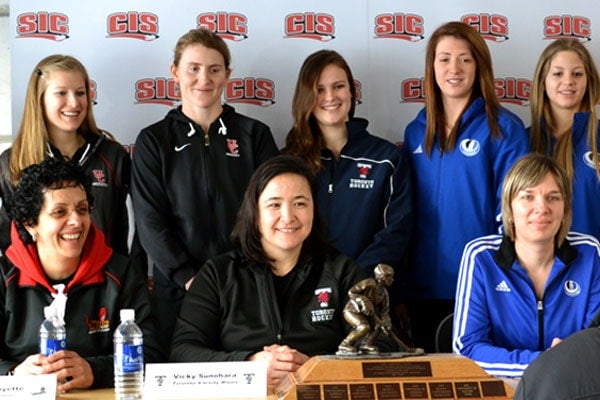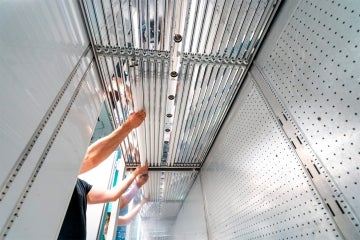
Women’s hockey finals pit gold medal Olympic teammates against each other
Published: March 7, 2013
Former Olympic teammates will compete against each other this weekend when the University of Toronto hosts the Canadian Interuniversity Sports (CIS) women’s hockey championships.
“It’s great to be back,” said Vicky Sunohara, head coach of the Varsity Blues women’s hockey team. “It’s a different level we’re playing, and we’re coaching against each other, but it is just fun-- it’s a great reunion.”
U of T’s Sunohara is competing against three former gold-medal-winning Olympic teammates now with the reigning champion Calgary Dinos: coach Danielle Goyette, assistant coach Kelly Bechard, and forward Hayley Wickenheiser.
They’ll be fighting for top spot at the CIS tournament, which runs March 7 to 10 at Varsity Arena. It’s the first time U of T has hosted the women’s national university finals since 1999.
While six teams face off for the tournament, 31 schools compete during the CIS regular season. That’s a 35 per cent increase since the inaugural tournament in 1988, said Beth Ali, director of intercollegiate and high performance sport at U of T.
“The pioneers of the game are now coaching, mentoring or back in school finishing their education,” said Ali. “These impressive women continue their contribution to hockey by developing the next generation of outstanding female athletes.”
Reflecting on the transition from Olympic ice to the CIS coaching bench, Goyette spoke about the importance of sharing her skills and knowledge:
“The girls that played with me and Vicky are giving back to the game now and giving the girls a chance to gain from the experiences we had,” she said.
And the former teammates continue to support each other in this new competitive context, said Sunohara.
“Danielle has coached a bit longer than me and I’ve got a lot to learn,” she said. “It’s great to hear her experiences. We talk about experiences playing, we talk about experiences coaching and it’s great to have that friendship continue.”
The friendship endures, Goyette agreed, “but when we’re on the bench, we’re not friends anymore.”
For Wickenheiser, the transition to CIS-level hockey was more of a challenge than anticipated.
“It’s harder hockey to play, things don’t happen quite as naturally as when you play at the higher levels or with more experienced players,” she said.
“By the same token, it’s exciting; it’s really unpredictable. At any point in the game things can change. I think for a fan that’s exciting to watch… but it’s probably the hardest hockey I’ve ever played. You have to be more patient, you have to find ways to make players around you better and at the same time keep emotions in check in terms of emotion, staying calm, because turns in the game happen often.”
The unpredictability of CIS hockey may work in favour of the Varsity Blues at this tournament. The team did not win a berth based on its performance this season but will get to play as hosts.
“We didn’t want to get in just for hosting, but the reality is that we’re here, and the national championship comes down to one game at a time, and we feel that we’re well rested and we’re going to give it our best shot,” said Sunohara. “We all believe it’s a weekend and anything can happen, and we’re ready to play.”
“We’re not really expected to do great, so it takes the pressure off,” said Kelly O’Hanlon, team captain for the Varsity Blues. “Being the underdog-- it’s the best locker room to be in, because anything can happen.”



